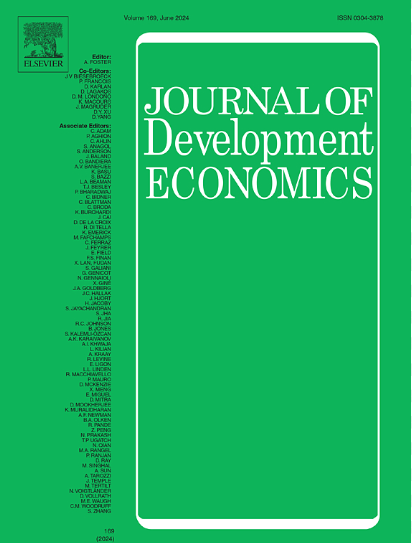贸易政策与出口商的韧性:来自印度尼西亚的证据
IF 4.6
1区 经济学
Q1 ECONOMICS
引用次数: 0
摘要
贸易政策如何影响出口商采购中间投入和调整出口以应对外国冲击的能力?该分析利用了印尼企业面临的非关税措施(ntm)的新分类、时变数据。人民币贬值使中国出口产品在第三市场上更具竞争力,因此,与没有NTM的企业相比,投入面临NTM的印尼企业的出口价值下降幅度要大得多,这种影响的程度取决于NTM的类型。我们的研究表明,这种差异可以解释为面对新关税机制的企业在面对人民币贬值时无法利用来自中国的更便宜的中间投入,这与新关税机制施加固定进口成本的模型相一致。这些发现表明,改革某些类型的进口非关税机制可以对出口商的抵御能力产生积极影响。本文章由计算机程序翻译,如有差异,请以英文原文为准。
Trade policy and exporters’ resilience: Evidence from Indonesia
How does trade policy affect exporters’ ability to source intermediate inputs and adjust exports in response to foreign shocks? The analysis exploits new disaggregated, time-varying data on non-tariff measures (NTMs) faced by Indonesian firms. In response to a depreciation of the Yuan, which makes Chinese exports more competitive in third markets, Indonesian firms facing NTMs on their inputs see a much larger drop in their export values compared to firms that do not face any NTMs, with the magnitude of this effect varying depending on the type of NTM. We show that this difference can be explained by the inability of firms facing NTMs to take advantage of cheaper intermediate inputs from China in the face of depreciations of the Yuan, consistent with a model where NTMs impose fixed costs of import. These findings suggest that reforming some types of import NTMs can positively affect exporters’ resilience.
求助全文
通过发布文献求助,成功后即可免费获取论文全文。
去求助
来源期刊

Journal of Development Economics
ECONOMICS-
CiteScore
8.30
自引率
4.00%
发文量
126
审稿时长
72 days
期刊介绍:
The Journal of Development Economics publishes papers relating to all aspects of economic development - from immediate policy concerns to structural problems of underdevelopment. The emphasis is on quantitative or analytical work, which is relevant as well as intellectually stimulating.
 求助内容:
求助内容: 应助结果提醒方式:
应助结果提醒方式:


